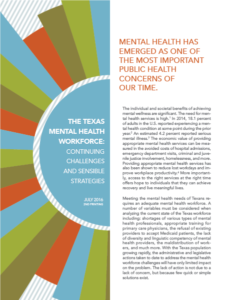Policy Brief: The Texas Mental Health Workforce: Continuing Challenges and Sensible Strategies
Introduction
The individual and societal benefits of achieving mental wellness are significant. The need for mental health services is high.
In 2014, 18.1 percent of adults in the U.S. reported experiencing a mental health condition at some point during the prior year. An estimated 4.2 percent reported serious mental illness. The economic value of providing appropriate mental health services can be measured in the avoided costs of hospital admissions, emergency department visits, criminal and juvenile justice involvement, homelessness, and more. Providing appropriate mental health services has also been shown to reduce lost workdays and improve workplace productivity. More importantly, access to the right services at the right time offers hope to individuals that they can achieve recovery and live meaningful lives.
Meeting the mental health needs of Texans requires an adequate mental health workforce. A number of variables must be considered when analyzing the current state of the Texas workforce including: shortages of various types of mental health professionals, appropriate training for primary care physicians, the refusal of existing providers to accept Medicaid patients, the lack of diversity and linguistic competency of mental health providers, the maldistribution of workers, and much more. With the Texas population growing rapidly, the administrative and legislative actions taken to date to address the mental health workforce challenges will have only limited impact on the problem. The lack of action is not due to a lack of concern, but because few quick or simple solutions exist.

